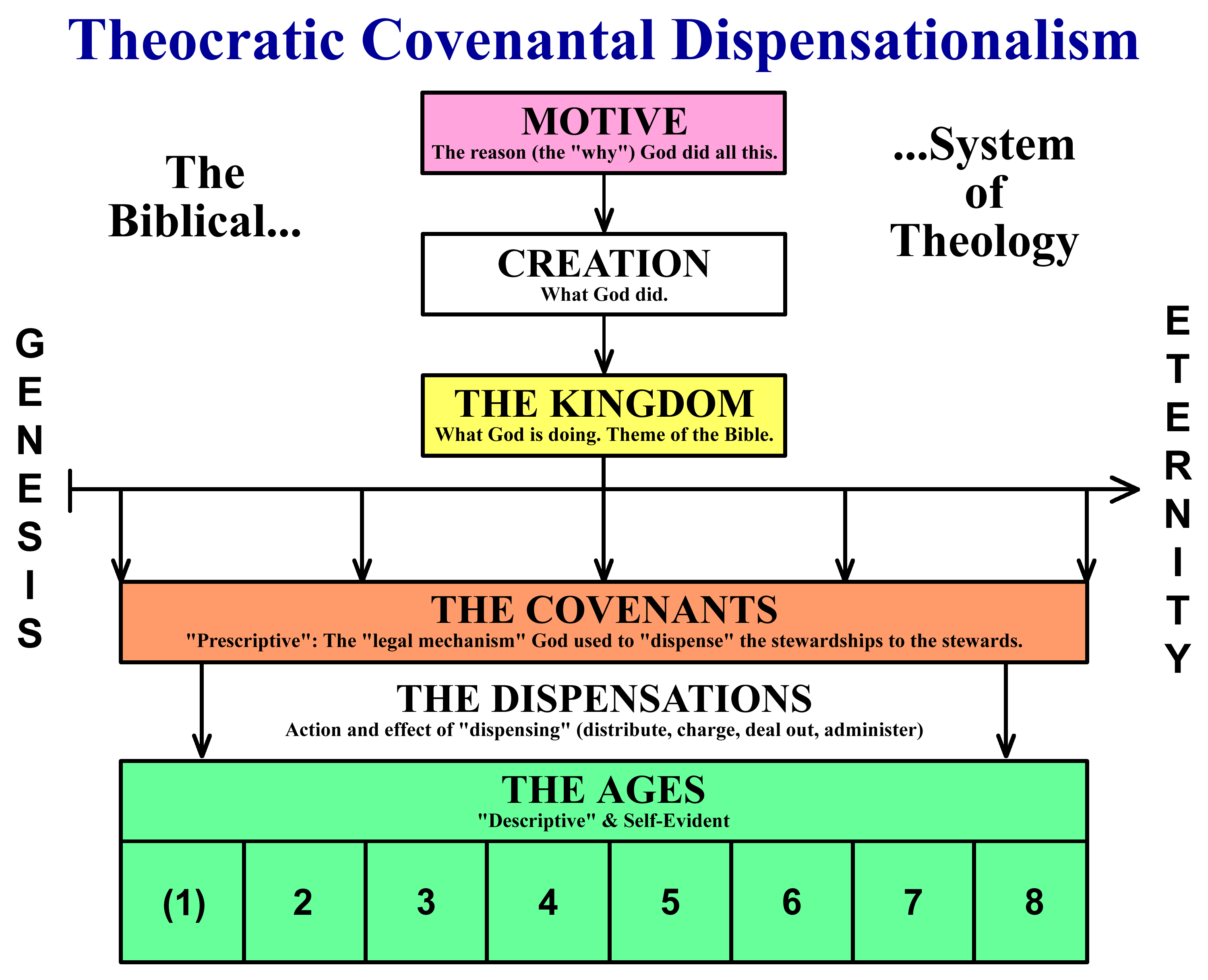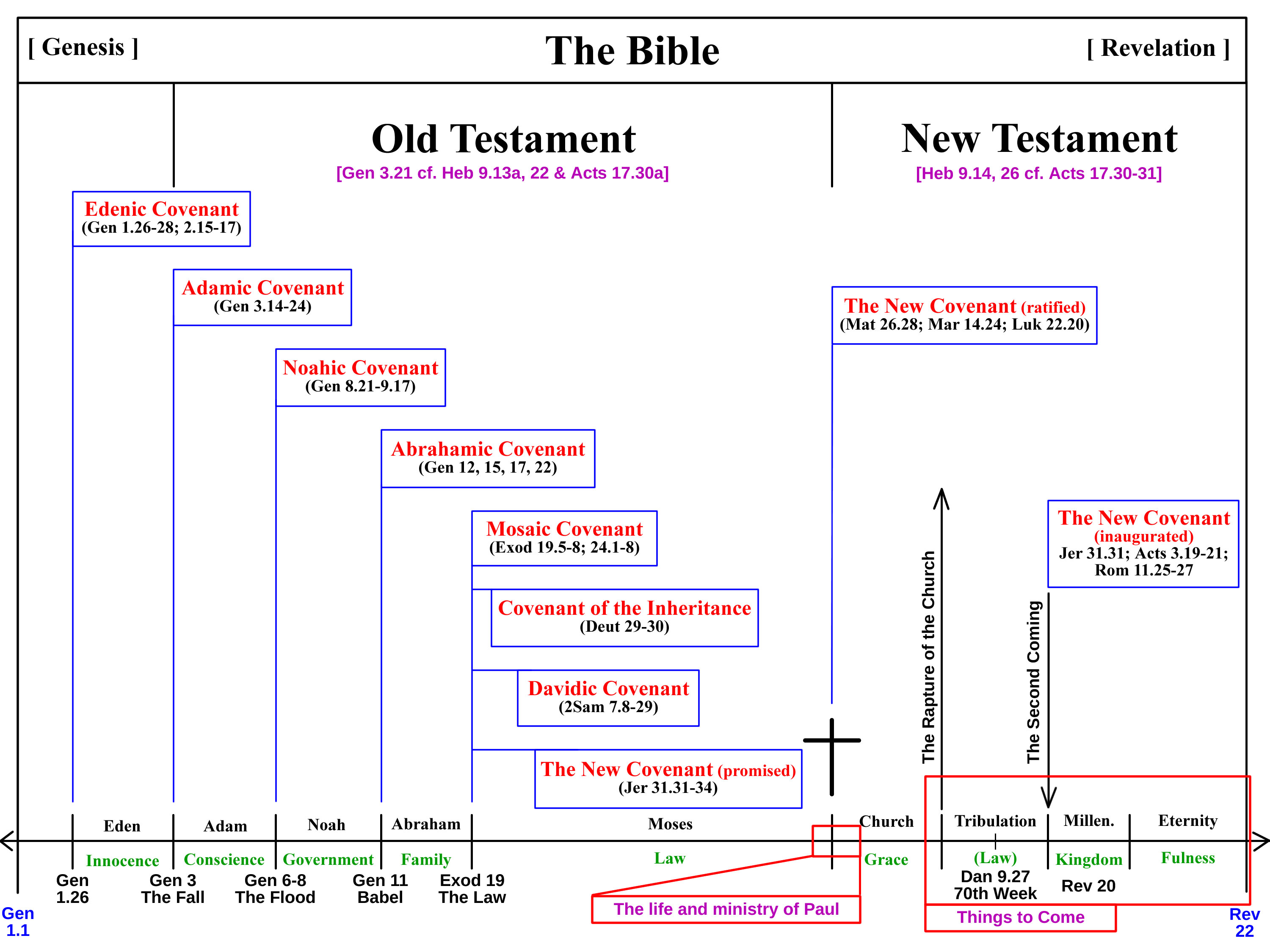Table of Contents
Dispensationalism
Biblical Dispensationalism is also known as Theocratic Covenantal Dispensationalism. It is the recognition of separated, distinct, and self-evident economies in biblical history that are established through the biblical covenants, and which all form part of the unifying theme of the Bible: The Kingdom.
I order to learn about all of this, I want to put together an introductory study of the Bible and its structure as a unified whole. That means I want to study out a “biblical theology,” like Walter Kaiser described:
Biblical theology is the quest for the big picture or the theological wholeness and the overview that brings out the unity, the plan, the cohesiveness, and the purpose of God as that plan moves through the course of history.
But unlike so many of the “scholarly” biblical theologies out there, I want a “biblical” biblical theology–a biblical theology based on the Bible.
And that's why I started with the first study below: What is the Bible…?
| What is the Bible? | |
|---|---|
| Study | Links |
| 1. The Bible is a Covenant Corpus | odt, pdf, audio1, audio2 |
| 2. The Bible is Authoritative | odt, pdf, audio |
| 3. The Bible is Accessible | odt, pdf, audio |
| YouTube Videos (entire series) | playlist |
—-
Self-Evident
Dispensationalism is Self-Evident: notes
Thesis: Dispensationalism, as a system of theology, is self-evident to the normal reader of Scripture.
Outline:
- What is a System of Theology?
- Hermeneutics: The Essential, Independent Basis for Theology
- Normal-Literal Interpretation: The Essental Part of Dispensationalism
- Self-Evidence: Dispensationalism is a Self-Evident System of Theology
Soteriology
Dispensationalism & Soteriology: Israel vs. the Church
Was an individual Israelite in the Old Testament saved the same way as you? Was he saved in the same time frame as you? Was he guaranteed the same things as you? Was his salvation conditioned the same as yours?
Scripture is unintelligible until one can distinguish clearly between God's program for his earthly people Israel and that for the church. ~J. Dwight Pentecost
Thesis: Israel and the Church are different and distinct in God's plan and purpose for the ages, and this distinction is clearly seen in the differences in their soteriology and resulting eschatology.
Conclusion: Dispensationalism is a system of theology that consistently recognizes and maintains the biblical distinction between Israel and the Church (as is seen in the dispensational analysis of each people's soteriology and eschatology).
These systems do set up conflicting and opposing principles; but since these difficulties appear only when an attempt is made to coalesce systems, elements, and principles which God has separated, the conflicts really do not exist at all outside these unwarranted unifying efforts; in fact they rather demonstrate the necessity of a due recognition of all God's different and distinct administrations. The true unity of the Scriptures is not discovered when one blindly seeks to fuse these opposing principles into one system, but rather it is found when God's plain differences are observed. The dispensationalist does not create these differences as he is sometimes accused of doing… Instead of creating the problems, the dispensationalist is the one who has a solution for them. ~Lewis Sperry Chafer
Etymology of Economy
Four times in the English New Testament the word “dispensation” appears (1Cor 9.17; Eph 1.10; Eph 3.2; Col 1.25) and it is always a translation of the Greek word oikonomia, a word very similar to our English word “economy.”
That shouldn't surprise us since the English word “economy” is derived from the Greek oikonomia. In Greek oikos means house and nemein means manage. Together oikos + nemein (house + manage) form oikonomia and it refers to household management (the managing of the resources and/or affairs of a household) as a servant or steward would manage the household affairs of his master (link).
The English word “economy” means the same thing (as it comes from the Greek through Latin and French): it means “management of resources.” A common definition of “economy” is given by Webster:
- The management of resources.
- The management of household affairs.
The person charged with managing the resources and/or household affairs of another is called, in English, a steward. And (wouldn't you know!) that English word “steward” in the King James Bible is a translation of oikonomos, thus showing us that each dispensation is an economy based on the stewardship that God gives a steward, expecting that steward to manage the resources and affairs committed to him by the Lord according to the will and desires of the Lord.
1Corinthians 4.1-2: Let a man so account of us, as of the ministers of Christ, and stewards [oikonomos] of the mysteries of God. Moreover it is required in stewards [oikonomos], that a man be found faithful.
Dispensations are not the invention of John Darby. They are the economies (stewardships) that God establishes with men throughout history.
Charts & Timelines
TCD Chart
Short video about this (and the following one) on YouTube, and you can download the images to “step through” the chart:
| Description | Link |
|---|---|
| 1. Bible Timeline | jpg |
| 2. Self-Evident Ages | jpg |
| 3. Covenants | jpg |
| 4. Dispensations | jpg |
| 4a. Didactic Tool | jpg |
| 5. Kingdom | jpg |
| 6. Delegation | jpg |
| 7. Creation | jpg |
| 8. Motive | jpg |
| 9. Title | jpg |
| 10. Subtitle | jpg |
TCD Timeline
Short video about this (and the one above) on YouTube, and you can download the images to “step through” the chart:
| Description | Link |
|---|---|
| 1. Bible Timeline | jpg |
| 2. Old & New Testaments | jpg |
| 3. Age: Law | jpg |
| 4. Age: Eden | jpg |
| 5. Age: Adam | jpg |
| 6. Age: Noah | jpg |
| 7. Age: Abraham | jpg |
| 8. New Testament | jpg |
| 9. Covenant: Eden | jpg |
| 10. Covenant: Adam | jpg |
| 11. Covenant: Noah | jpg |
| 12. Covenant: Abraham | jpg |
| 13. Covenant: Moses | jpg |
| 14. Covenant: Inheritance | jpg |
| 15. Covenant: David | jpg |
| 16. Covenant: New, Promised | jpg |
| 17. Covenant: New, Ratified | jpg |
| 18. Covenant: New, Inaugurated | jpg |
| 19. Paul | jpg |
| 20. Eschatology | jpg |


